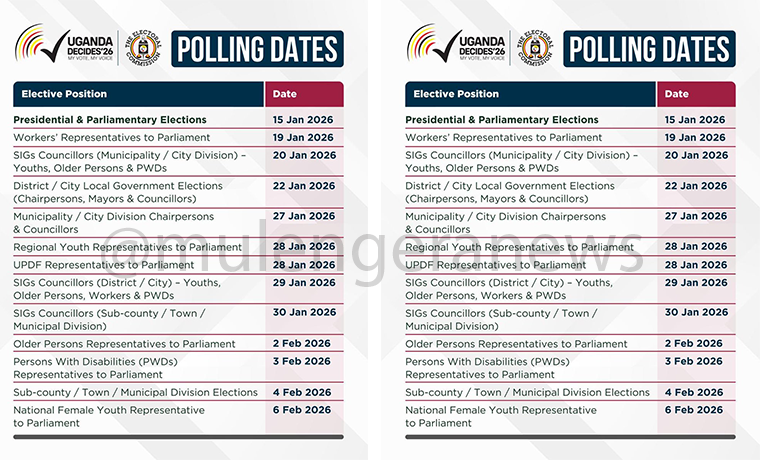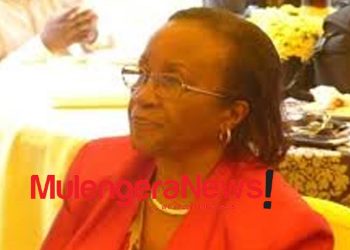By Mulengera Reporters
Study findings recently published on the online journal called “theconversation.com” ranks our own Janet Kataha Museveni the most influential and exemplary First Lady on the African continent. 70-year old Janet is closely followed by Burundi’s Denise Bucumi Nkurunziza and Grace Mugabe, formerly of Zimbabwe.
The ranking was determined basing on a research by two University Professors/researchers-Jo Ansie van Wyk and Chidochashe Nyere who respectively work with University of SA and University of Pretoria. Authorities at the “South African Journal of Political Studies” that commissioned the research say the study was undertaken after realizing that First Ladyship is one powerful institution that is always underreported yet very pivotal in the running of many African states.
The two researchers proceeded on the conviction that (even when their office isn’t mentioned anywhere in the respective national Constitutions), the African First Ladies are increasingly becoming assertive and tremendously influencing things through active participation in peace missions, summits, charity works, health and politics of their respective countries.
In some instances, First Ladies have used their proximity to the big men to become obstacles to accountable leadership as the corrupt could once in a time run to them seeking protection against anti-corruption institutions of the State. The two researchers considered First Ladies very influential because of their privity to the executive branch of government and other decision-makers in the respective countries.
JANET SHINES
The two Professors’ analysis disclosed why they considered Janet very influential. That being First Lady for such a long time, without break coupled with direct participation in execution of both the legislative (as MP Ruhama 2006-2016) and executive functions (as Minister initially for Karamoja and now Education) have combined to give Janet a lot of clout.
The researchers also reflected on her pioneering role in the HIV support programs as early as the 1980s when she founded UWESO which supported children and women orphaned and widowed by HIV-Aids that ravaged Uganda in the early Museveni years. They credit Janet for strengthening her husband’s long rule through many ways including being exemplary in her conduct of public affairs. That longevity in office has enabled her build clout and network of allies to become a politically very influential figure nationally within Uganda, regionally and internationally.
For comparative purposes, the researchers also reflected on the US whose former First Lady Hillary Clinton always had tremendous influence on the way business was conducted both at White House and Capitol Hill for the period her spouse Bill was President. Equally powerful Imelda Marcos of Philippines was perceived in the same way on top of sometimes being accused of using her First Lady office to indulge in inappropriate conduct.
As for Janet, the two researchers find that she has used spirituality and publishing on her personal life experiences (published own memoirs) to broaden her reach and in the process influence opinions and public perceptions on things. And the SA researchers conclude all these have in some way impacted on Museveni’s political strength.
The researchers say that by conspicuously keeping silent on their spouses’ governance failures, the First Ladies have in some way shielded Presidents from would-be deeper public scrutiny.
Referencing on 2014 Global Decency Index, which reflected on the First Ladies’ sense of fashion or class and christened Janet “Africa’s most decent First Lady,” the SA researchers conclude that the title “Mother of the Nation” is well deserved and merited for the very prayerful lady from Ntungamo. They reflect on her spontaneous heart for vulnerable groups as manifested in her passion for interests like maternal health.
Describing her as one who is “teacher by profession and politician by practice,” the authors also make another very striking characterization about Janet observing that “her pious and nurturing image [enhances] her husband’s credibility locally and internationally.”
Janet, who in 1973 married Museveni when she was 24, is also presented as someone whose 2009 posting to the hitherto despised Karamoja docket was used to manifest the “President’s affection” for the historically very marginalized inhabitants of that remote part of the country. Her deep spiritual devotion is also noted by the authors specifically referring to her belief that Museveni is able to do the sort of things he does because God ordained him to.

THE OTHERS
The other powerful Presidents’ wives referred to in the online article include Burundi’s Denise at whose instigation President Nkurunziza declared Thursday to be a national day of praying and fasting in Burundi every week. The ritual is strictly applicable to leaders who subscribe to Burundi’s ruling party for which Denise heads the women league. She is also a reverend in Church and uses the pulpit to deepen the public’s understanding of her hubby’s priorities and values for the country.
She uses the pulpit to keep telling people her hubby Nkurunziza was ordained by God to rule over them. She is also Nkurunziza’s contact person to many strong lobbyists in Western capitals especially those that profess Christianity. In the Burundi military, many female officers claim to be inspired by Denise who remains their role model.
Grace Mugabe is Zimbabwe’s immediate ex-First Lady but the journal article refers to her because of the extreme influence she wielded both as Mugabe’s wife and also leader of ZANU-PF Women’s League (2014-2017). She had grown so powerful and somewhat insensitive to the extent of proudly telling off her hubby’s critics that he would rule over Zimbabwe even when he grew into senility. Justification was God had ordained him. Her provocative utterances made during her “Meet the People” tours angered many members of the ZANU-PF Politburo resulting into the Mugabe isolation and eventual ouster. Using her close and manipulative proximity to Mugabe, Grace had grown into a defacto head of state that would directly deal with and host Heads of State & Government both at her House and State House Harare, the authors note. That she exploited such privileged networks to acquire properties and conduct lucrative business.
Tanzania’s Janeth Magufuli is contrasted with her more outward-looking peers and the researchers conclude she is one of the obscure First Ladies in Africa if not the most. That she has given in to African patriarchy subordinating women to kitchen and domestic roles to the extent that even in her own country Tanzania, many citizens would struggle to identify or recognize her. She was a primary school teacher for 20 years before Magufuli became President and the researchers found that she hasn’t easily transitioned to her new role. Magufuli’s attitude too must have contributed to this state of affairs. A fan of African traditional conservative values, Magufuli is quoted to have once justified her invisibility on the fact that in Africa, wives are expected to excel in the domestic arena.
Kenya’s Margaret Gakuo Kenyatta too isn’t ranked very favorably by the authors when it comes to the SA scholars’ list of influential First Ladies. They observe that there isn’t much to write home about her influencing public life in Kenya beyond the “Beyond Zero Initiative” she commenced in 2014 one year after becoming First Lady. The initiative advocates for better healthcare for vulnerable groups like the PWDs, children, women and elderly. She is nevertheless down to earth and many Kenyans like her for that and became even more proud of her when the UN ranked her “Kenya’s Personality of the Year [2018].”
Nigeria’s Aisha Buhari (First Lady since 2015) is ranked very favorably in the report. She is remarkable for her high formal education levels and boldness which has seen her fearlessly utter controversial statements often rubbing President Buhari the wrong way. The professional cosmetologist and beautician has always insisted in disabusing the First Lady office from past characterizations that caused her predecessors to be perceived as insensitive, rude, arrogant and power-corrupted.

Insisting to speak for the silent majority the ordinary people, Aisha in 2016 shocked Nigerians when she publicly stated she was considering resisting her husband’s reelection on grounds of poor service delivery. She complained her husband had been captured by a powerful clique in the ruling party and wasn’t in charge of the government which Nigerians elected him to lead. Not even coming from the very conservative community in Northern Nigeria that culturally ties women to subordinate roles has cowed Aisha Buhari from asserting herself. She is also the brain behind the pro-vulnerable groups’ intervention called “Future Assured Program” which advocates adolescent girls’ empowerment via access to quality education and health services. Buhari’s efforts to publicly shut her up haven’t yielded much fruit.
Mary Ayen Mayardit is another powerful African First Lady said to exercise extreme control over her husband President Salvar Kiir of South Sudan. She is a General by rank and a veteran of the SPLA war that resulted into South Sudan becoming an independent nation. Modestly educated, she was part of the liberation war for a whopping 21 years. The SA researchers make many intriguing findings about her including being accused of fueling the war between Kiir and other SPLA factions. Having come under tremendous pressure personally as a First Lady, Gen Ayen is credited for being the one who pushed Kiir to the international community-mediated talks to negotiate peace with Dr. Riek Machar. (For comments, email us at mulengera2040@gmail.com).






























